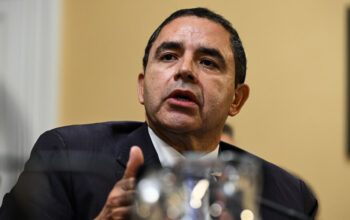
EDINBURGH, Scotland — As they walked to dinner with friends on Wednesday night, hours after Nicola Sturgeon announced that she would step down as leader of Scotland’s government, John and Ilonka Hughes firmly agreed that Ms. Sturgeon had been a savvy navigator of Scottish politics.
But that’s where the agreement ended.
Mr. Hughes, 80, said that Ms. Sturgeon “had done a lot for Scotland, she has been wonderful,” and that he had long supported her Scottish National Party’s push for independence. Ms. Hughes, 74, acknowledged Ms. Sturgeon’s significance as the first woman to be first minister of Scotland and the nation’s longest-serving leader, but added: “I’m not a fan, I don’t want independence. We need to stay where we are, even if lots of things need to be changed.”
The Hugheses’ personal political divisions reflect a broader national perspective on Ms. Sturgeon, one that political experts say stems from Scotland’s internal debate about independence. Ms. Sturgeon alluded to the challenge presented by partisan loyalties when she made her surprise announcement.
In her resignation speech, Ms. Sturgeon pointed to personal reasons as well as political ones as driving forces behind her departure, saying that a push for independence required total commitment that she could no longer provide.
Lorraine Main, 50, who had spent the day running errands in Edinburgh with her daughter on Wednesday, said that she was left stunned by the news of Ms. Sturgeon’s resignation.
“She has been here a long time and I certainly was not expecting it,” Ms. Main said, adding, “I think it would be a shame if she was pushed out of power, but if she has resigned for her own personal reasons, that’s fair enough.”
She said she thought that Ms. Sturgeon’s legacy would live on long after she stepped down. Ms. Main acknowledged, however, that not everyone held a favorable view of the Scottish leader.
“I think people are very divided on her, especially after the last independence vote,” she said. “I liked her, but I know a lot of people didn’t.”
Ms. Sturgeon took the helm of the Scottish National Party in late 2014 just months after the nation’s voters rejected independence from Britain, and she has never stopped pushing for Scottish secession. After Britain’s 2016 vote to leave the European Union, she seized on the moment to bring new urgency to the movement, and last year announced plans for another referendum on independence to be held in October 2023.
Ms. Sturgeon’s unflinching push for a new vote has alienated some, as have recent political disputes — like recent tensions over transgender rights — that have amounted to shorter-term setbacks. Ms. Sturgeon acknowledged as much on Wednesday when she suggested that some in Scotland and across Britain would be happy to see her step down.
But John Curtice, professor of politics at the University of Strathclyde, said that even though Ms. Sturgeon had her detractors it was more a reflection of Scottish politics than a reflection of her political brand, and that the view of her leadership, despite recent economic headwinds, has been overwhelmingly positive.
“There are plenty of unionists out there who dislike her, as well as lots of nationalists who like her,” he said. “I am not sure it comes to anything more than the territory of Scottish politics, in the sense that we are talking about a country that is deeply polarized over this constitutional question.”
In fact, Ms. Sturgeon’s popularity has grown significantly since she took office, as she profited from a wave of enthusiasm for the independence cause as its most vocal proponent.
She received a further boost during the coronavirus pandemic as many Scots looked favorably on her handling of the crisis, which drew a distinction with how England approached the pandemic. Ms. Sturgeon was seen as sending a clear message that Scotland needed to do everything in its power to combat the spread of the virus, in contrast to a more freewheeling approach from the English government. She was regarded as more in touch than Boris Johnson, the English prime minister at the time, and in command of the details, Professor Curtice said.
Based on polling, it seems that for every person satisfied with her leadership, there was another dissatisfied with it, Professor Curtice added, which he said was still an impressive show of popularity for a political leader.
“After eight years in office, most leaders would settle for that,” he said. “I am sure President Biden would currently settle for that, Rishi Sunak would currently settle for that,” he added, referring to the current English premier. “Boris Johnson would have happily have settled for that before he resigned.”
For many in Edinburgh on Wednesday, the significance of the political shift was undeniable, but city life continued largely unfazed. In the afternoon, a small crowd gathered outside Bute House, Ms. Sturgeon’s official residence, as news of her announcement broke. At one point, Ms. Sturgeon was spotted waving to people, most of whom were supporters, from the windows and offering a quick thumbs up.
There was also a small contingent of women holding signs that read, “We told you so,” and “Destroyer of women’s rights,” referencing the heated dispute over a bill that would have made it easier for those in Scotland to legally change their gender. The measure was blocked by the British Parliament.
But by early evening, as the sun was setting over the city, the street in front of Bute House was quiet, leaving only the normal rhythm of the city after a major day for Scottish politics.
On a nearby street, Sean McMillan, 29, said the news of Ms. Sturgeon’s resignation has spread rapidly around his office early on Wednesday, and hours later he was still struggling to process the news.
“I do quite like her; there’s not a bad thing I can say,’’ he said. “And I’d say she has done a very good job in the last eight years, and I guess we don’t know what’s coming next.”
Ms. Sturgeon had risen to become a major political figure, not just in Britain but on the international stage as well, and regardless of political allegiances, it was difficult not to see her resignation as leaving Scotland with a major gap.
John Wedgebury, 40, who was visiting Edinburgh for work, said it felt like a “bit of a vacuum has been left to be filled, and I am not really sure what is going to fill it.”
Mr. Wedgebury added that the highly personal language of Ms. Sturgeon’s resignation address — in which she pointed out: “I am a human being as well as a politician” — and candid comments about the personal strain of life as a political leader had parallels to the recent resignation of Prime Minister Jacinda Ardern of New Zealand.
“People will of course draw comparisons to Jacinda Ardern, and I think it’s fair enough,” he said. “She said that politics has become a bit more brutish and to sustain that for such a long time, that has got to be tough for anyone.”



